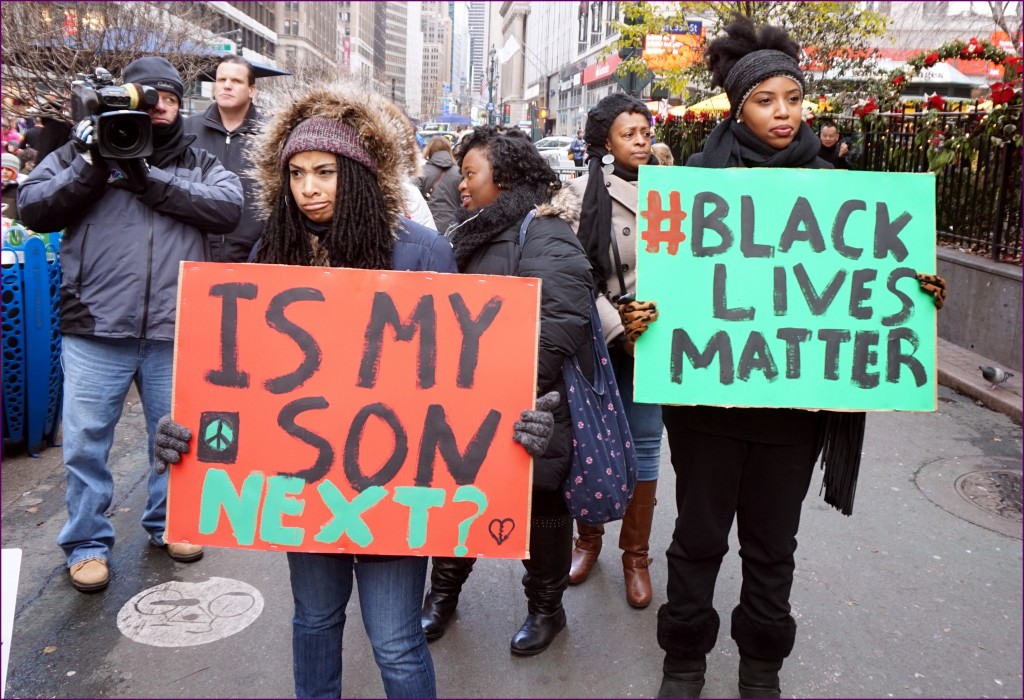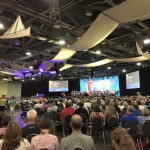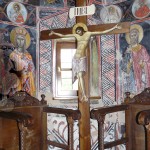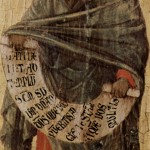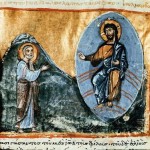What follows is a sermon I preached this morning, using 2 Samuel 11:1-15 as the text. I hesitate to post it here, because sermons like this are so contextual and specific to the communities to which they are delivered, but I feel strongly about the words I say here, and I want to share them.
This is a sermon about Sin. That’s Sin with a capital S and no plural at the end. But I want to start with a story about sins…with a small s at the beginning and the plural s at the end.
When I was a kid, maybe 6 or 7 years old, my family didn’t really go to church, but we did live across the street from the largest church in town, a towering brick Southern Baptist church. From an early age I seemed to have a curiosity about the whole religion thing, and so I would beg my parents to let me go across the street and take part in all the stuff going on there. So I grew up going to Mission Friends, which was the Wednesday night children’s program, and occasionally to Vacation Bible School and Christmas pageants and even Sunday School a few times a year. I remember one Sunday I showed up in Sunday School, and it was rare enough for me to be there that I didn’t really know how things were supposed to work. So I’m sitting there at this long table as the teachers start the lesson for the day, and it turns out that the lesson that day was on the Ten Commandments. All the other kids seemed to have them all memorized, so I guess that they had been studying them for a while, and I felt a little underprepared. But we went through them one by one, with someone reciting them or reading them out loud, and eventually we got to the one that read, “thou shalt not commit adultery.”
I sat there for a second and then I raised my hand. I’m sure, in hindsight, that that was the moment when the Sunday School teachers’ hearts all sank. Isn’t that the worst imaginable moment? You’ve agreed to teach children’s Sunday School, reluctantly probably, and you’re there doing it and the new kid in class that week raises his hand the moment the word “adultery” is said. But they called on me, and I asked, in all innocence and ignorance, “what’s adultery?” I mean, after all, I’m sure I was thinking, if it was one of the ten commandments, and if I wasn’t supposed to commit it, then I really needed to make sure I knew what it was, so I didn’t commit it, even accidentally. So I asked my question there to those Sunday School teachers, what’s adultery, and they looked at me for about a half a second, and then they refused to tell me! I don’t remember exactly what they said or how they ducked the question, but it was something to the effect of “you don’t need to worry about that right now” or “we will talk about that when you are older.” I was pretty confused by the exchange, since thirty seconds earlier we were talking about how these ten commandments were the ten most important things you could know for the living of your whole life, and now I was being told essentially that this particular commandment was above my pay grade. So I went home and I grabbed my dictionary—the beginnings of my scholarly research agenda for the bible—and I looked up the word adultery. And I remember reading the definition, and thinking, “oh, ok,” and I closed the book and I moved on with my life.
It’s funny how much we like to talk about Sin, and sins, how much we like to moralize about behaviors, but how little we want to say about it when it presents itself in our faces. We love to tell people how to act, what sins to avoid committing, but we clam up when it comes time to account for the specifics of those actions. Hold that thought for later.
Many of you, if not most of you, are here today at a church like this because somewhere along the line you were told that religion is all about the thou shalts and the thou shalt nots. Maybe it was a priest who always seemed to emphasize how terrible you were, or maybe it was a church service that told you that you were sinful in some specific and terrible way that other people weren’t sinful, or maybe it was just a lingering sense that you were always on trial for your behaviors and your inclinations, that your worst thoughts and actions were the things that defined you. It’s amazing, how often people show up here carrying deep wounds from being told that they are irredeemable, or dirty, or that they should be ashamed, or that they have no place in a church, that they have no place in God’s presence. Sometimes they’re told this outright, but more often they get the message slowly, over years, in subtle ways that communicate that you are unworthy and that your sin has piled up a debt you can never pay. Christianity, especially the kinds of Christianity that tend to predominate in this country, can often feel like a guilt machine, where human behavior goes in one side and shame comes out the other. The message is, “be ashamed and feel guilty for being a human being, and submit yourself to the blameless God who can pluck you from the depths of your own depravity.”
You can tell from the way I’m describing this system how I feel about it. This is the language of sins, the deeds and misdeeds that individuals commit. I think that this focus on little-s sins, in many churches, I think that it is religion that works like a payday loan company—it gives you an advance on God’s forgiveness so that next time you’ll have to come back for more. I don’t like the way this kind of Christianity works because it preys on those who are the most vulnerable—those who want to do the right thing, those who want to live righteously, and who pile up guilt upon guilt trying to get there. That’s why I don’t like that system, and that’s why I affiliate with a church like this one instead of one of the thousands of others across this city. That’s not how I see God, as a forgiveness loan shark, and that’s not what I think God is interested in, and that’s not the purpose, I don’t think, of this beautiful tradition that has come down to us over the years, to pile up shame to keep us filling the pews. So I reject that.
But by the same token, I sometimes worry that churches like ours, and ministers like me, can ignore the very real problem of Sin, with a big S. I worry that progressive Christianity ignores or downplays the category of Sin, the very real trouble with being human beings, the sand in the gears of our existence. Because the fact of the matter is that we can be pretty terrible. We do awful things to each other. We do terrible things to ourselves. We are broken in ways we do not even always understand, and we wound and are wounded in ways we do not always even see. In the same way that it’s wrong to leverage people’s guilt and shame for our own gain, the way some churches do, it’s also misguided to pretend like human nature is better than it is.
This passage from 2 Samuel is pretty shocking in the context of the rest of the Hebrew Bible. David is as close to a superhero as the Hebrew Bible gets; he is the ideal king who rules justly and who loves playing music and who dances before the Lord and who comes from humble origins and who treats even his enemies with respect and grace. At one point the text has it that David is a man after God’s own heart; that is, the heart that is in God is the heart that is in David. That’s pretty high praise, and it’s hard to imagine much higher.
But all that praise makes this story all the more incredible. David, here, made a series of terrible, terrible mistakes. He committed a series of sins, each building upon the last. Except none of these sins were exactly mistakes. None of them were accidents; each of them was something David did, consciously, to get what he wanted. The story starts with David catching sight of a woman bathing while he was walking on his roof. And he sent for her. And this story, this tale of David being so taken by this woman’s beauty, this story has been told in really romanticized and gauzy ways. The song that served as our prelude today, that beautiful song that Deb sang so well, it conflates David’s enthrallment with God and his enthrallment with Bathsheba, and the result is this erotic and deeply theological song that makes you feel a little uncomfortable but ultimately makes you feel good about things. David is infatuated with her in that song. But think about it. If you are a woman, and you have been seen bathing by the most powerful man in your country, and your husband is away at war far from home, and that powerful man sends his people and tells you to come to him, what can you do? What choice do you have in the matter? What possibility do you have of saying “no?” This story opens not with a note of love and infatuation, as it is sometimes read, but with a powerful person preying on a less powerful person who did not have the option of saying no. And so right from the beginning this is a story about sins, yes, but it is really a story about Sin, and the way Sin winds itself through our lives together. Sin is the improper use of power. Sin is the powerful bending the weak to their will. Sin is power getting what it wants.
So Bathsheba became pregnant, and David tried to cover it up. He called Uriah, her husband back home, Uriah was a soldier in David’s army, and David called him back, to his wife and his home, hoping that Uriah would later think the baby was his. But Uriah was too honorable, ironically, to play along, he wouldn’t sleep in his house and see his wife while his comrades were still in the fields of battle, and so David was stuck. His lust, his lust for power and his lust otherwise, his lust had gotten him into this situation, and all he could do was double down on power to get himself out of it. He sent Uriah right back to the battle, and he sent word to a commander, and he sent it in a sealed letter carried by Uriah himself, and the letter said, “put Uriah on the front lines, where the fighting is fiercest, and then draw back from him, so that he will be killed.”
This is the end of David’s sinfulness. This is the landing spot of the deception and the unjust use of power that he had unleashed. Uriah was sacrificed to protect the king from his own behavior. So that the king would get what he wanted. So that his tracks would be well covered. The man after God’s own heart set up a murder to cover his adulterous tracks, where “adultery” is the most generous possible reading of what he had done.
Up to this point I’ve talked about sin mostly as a personal matter, as the little-s sins with the plural. David committed these sins, of adultery and deceit and murder, and David and his selfishness were to blame. But of course sin is not limited to our personal acts. Sin is not only about behavior. Sin happens because of systems; sin happens because that’s the way this world is: broken and open to deep and serious flaws. So David was only able to do what he did because of the systems that were in place. Monarchy enabled his sin; the notion of an aristocracy to whom the rules don’t apply the same way they apply to everyone else, the way that society was set up made David able to do what he did. Patriarchy took away Bathsheba’s say in the matter; the systematic silencing of women’s voices in her society meant that she could not have cried out on her own behalf. David’s brokenness, and all the brokenness that flowed forth from it, all that brokenness was made possible because of broken systems, because of broken society, because of a broken world.
And here is where the witness of scripture is a witness to our own world, and I want you to hear me because this is a difficult thing. I don’t think there has been an age since the thick of the civil rights movement when our society’s deep sins have been made as clear as they have been made to us lately. I don’t know that we have been this well reminded of our collective sin and iniquity in at least a generation. I’m speaking, of course, of a whole host of societal, systemic sins, some of which I will name, but I want to highlight in particular the ongoing slow-moving tragedy of racism in this country, the systems of white supremacy and the subjugation of people of color that have sprung up in this season with alarming regularity. Sandra Bland and Trayvon Martin; Charleston at a church and Charleston at a traffic stop before that; Ferguson and Baltimore and the drumbeat of horrific stories that make me stop and ask every time I hear one on the news, I have to stop and ask, “wait, is this the one from the other day or is this a new one?” One of my favorite journalists described racism as a great underground fire, burning just beneath the surface of American society, breaking through the ground from time to time to flare up with visible flames. The flames should alarm us, when they break the surface, but what should really alarm us is that there is a fire smoldering just under our feet. What we should worry about is that there’s this thing that we’re scarcely aware of that has the power to destroy us. And it’s here among us, all the time, and we do almost nothing to reckon with it. This—a thing that we’re scarcely aware of that has the power to destroy us—this is what we mean when we say the word “Sin.”
The sin of racism, the systemic sin of racism, our nation’s original sin, is what made possible the sins of Dylan Roof. Roof, of course, and all individuals everywhere, are responsible for their own actions. But systems make those actions possible. Ways of thought undergird actions. Ideologies give birth to deeds. And silence is the friend of destructive ideologies. Silence is the friend of racism and white supremacy when people who hold privilege because of the color of their skin, people like me, when people like me are silent, that silence is the friend of racism. Silence is the friend of racism when we pretend that the privilege we derive from our skin color has nothing to do with the ideology that fueled Dylan Roof. Of course they are connected. Silence is the friend of gun violence when we appeal to history and tradition to justify gun laws unworthy of a first-world country and when we accept the horrible price of those laws as the cost of doing business. Silence is the friend of prejudice when a straight and cisgender person can live an unencumbered family life while others are denied the same opportunity. Silence is the friend of misogyny when men don’t stand up for women. Silence is the friend of destruction when we plunder our earth for our throwaway lifestyles and our conspicuous consumption. These are all sins that I’m mentioning, these are all small-s, plural sins, but they are undergirded by Sin. The sand in the gears. The brokenness in the world. The systems that enable all the small ways we hurt each other and hurt ourselves.
There is something of a happy ending to the story of David and Bathsheba, although it is not completely happy. It’s kind of a long story, and this is already kind of a long sermon, so I’ll cut it short: David ultimately understood the wrong he had done, and he repented of it. And he understood the wrong he had done in precisely the language of systemic Sin; he understood that the violations he had perpetrated flowed from his power and his position and his privilege. David, perhaps, was able to be a man after God’s own heart not because he was sinless, not because he was perfect, not because he somehow ducked all the guilt and shame that come along with realizing just how human your being is. David, I think, was able to have a heart after God’s own heart because he was capable of change. He was able to see, or better yet he was able to be shown, his place in society, and he was able to change himself and his behavior when he saw the violence he was doing. Maybe this is what made his heart like God’s: awareness.
I don’t know that awareness alone will stop the horrible litany of reports of our collective Sin, the stories upon stories of lives broken and ended by the Sin in our systems, by that great underground fire that breaks the surface more and more often these days. I don’t know that that alone will stop it. But knowing that it’s there, just under the surface, just the awareness of that…maybe that’s enough to get started. So let us get started. Let us get started. Amen.

